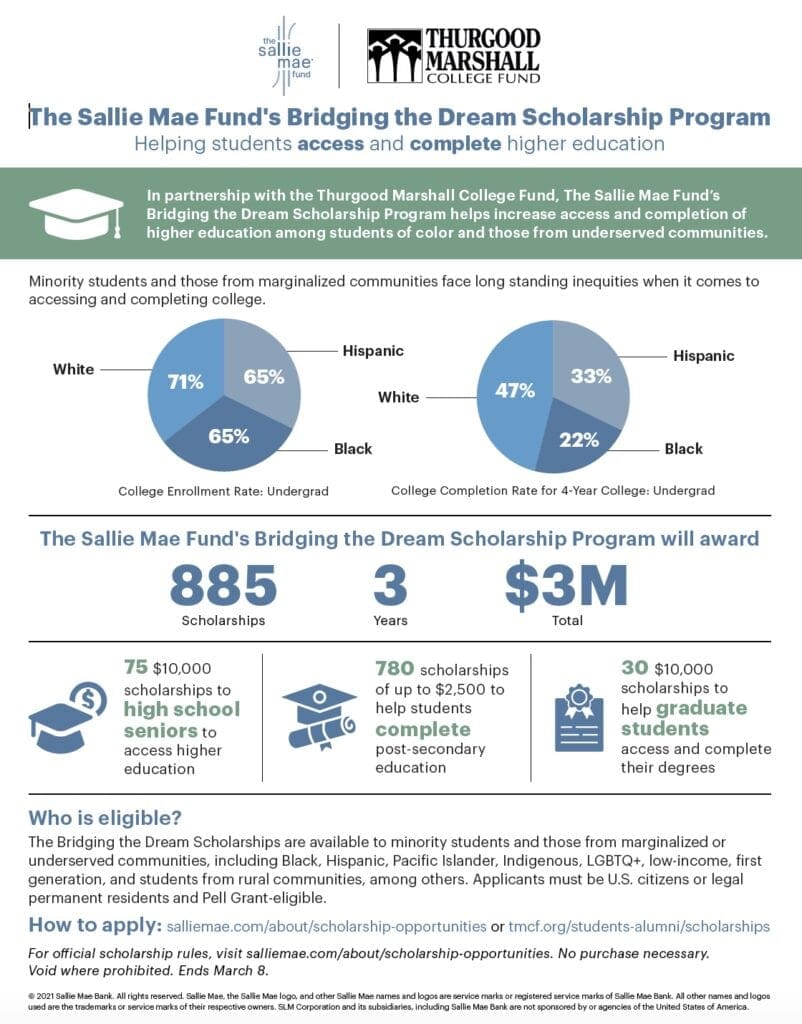Search Posts
Recent Posts
- Vinny Paz to be inducted TODAY into the International Boxing Hall of Fame – CES Boxing June 7, 2025
- In the News… quick recap of the week’s news (6.7.25) June 7, 2025
- Burn with Kearns: Strong without the spend: How scraps became strength tools – Kevin Kearns June 7, 2025
- Rhode Island Weather for June 7, 2025 – Jack Donnelly June 7, 2025
- How to advocate for threatened properties: The Heritage Alliance of Pawtucket June 7, 2025
Categories
Subscribe!
Thanks for subscribing! Please check your email for further instructions.
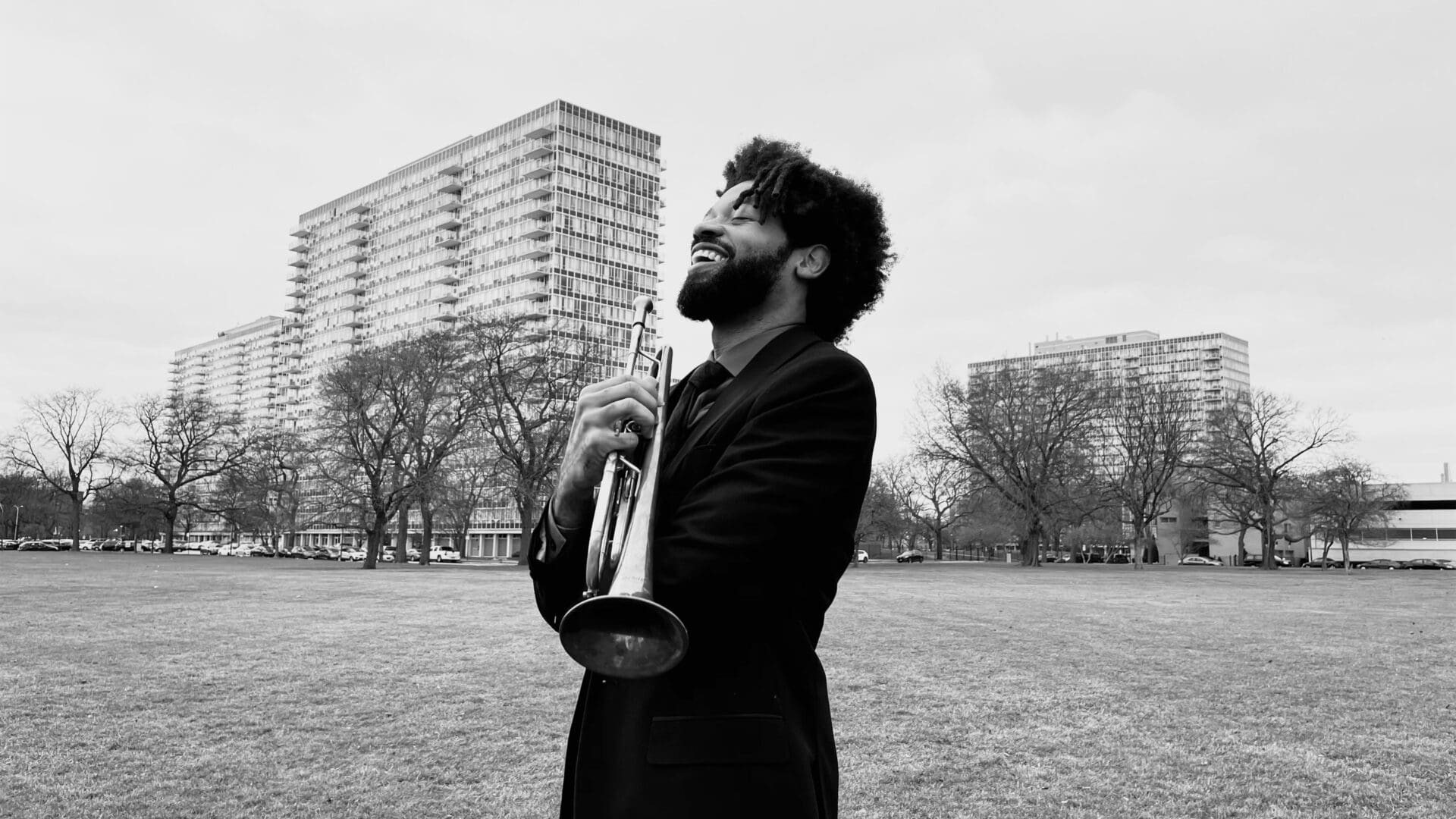
Black History Month
In Rhode Island
Sankofa Community Connection kicked off Black History Month outside of Newport City Hall Feb. 4th at City Hall in Newport as the red black and green flag is flown, honoring Black History Month. There was a Community Award Ceremony honoring Mrs. Pauline Perkins-Moye.
The Langston Hughes Community Poetry Reading – Langston Hughes’ powerful, poignant, and often amusing poems will be read aloud by members of the community for this virtual celebration. The event will be held on Sunday, Feb. 7th from 1 to 3pm. Langston Hughes’ poems, dating from the Harlem Renaissance through the 1960’s, continue to resonate today. These powerful, poignant, and often amusing works are read aloud by members of the community, accompanied by Manny Escobar + Leland Baker. Coordinated by the Langston Hughes Community Poetry Reading Reading Committee.The Langston Hughes Community Poetry Reading (LHCPR) has an important history within the Rhode Island community. The LHCPR was conceived as a program of the Langston Hughes Center for the Arts and Education in 1994 under the leadership of Anne Edmonds Clanton until 2015. The RISD Museum has hosted the readings since 1995. After the dissolution of the arts center in 1999, The RISD Museum felt that the LHCPR was so important to the museum and to the community it continued as the venue until recently. Several members of the Rhode Island and Southeastern New England community felt the LHCPR was so important that in 2015, a group of personally committed individuals formed the LHCPR committee to ensure the continued success of the annual poetry reading and created events related to the mission of the reading.
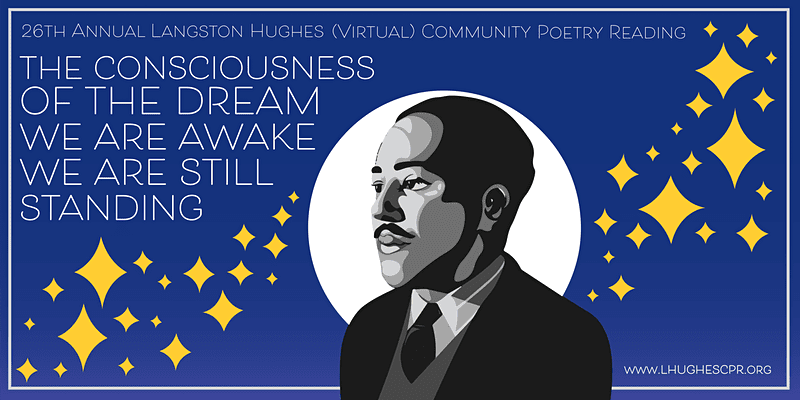
The secondary goal of the committee is to program and support continued community outreach to keep the reading a vibrant and well-attended event.The Haus of Glitter Dance Company + Performance Lab (part of the Glitter Goddess Collective) is honored to be producing this year’s 26th Annual Langston Hughes Community Poetry Reading. Even though we tend to express ourselves primarily through physical movement, for us, Langston’s legacy is a movement in itself. His poetry is in lineage with our ancestral tradition of expression, truth telling, deep feeling and dismantling. The Haus of Glitter would not exist without Langston Hughes. We are humbled by this invitation to carry on his legacy and we are so excited to hold space for our community to remember, dream and wake up with resilience and care for each other. With the politics of the breath that have been so present in the last year of our lives, this year’s Langston Hughes (Virtual) Community Poetry Reading is an opportunity for us to breathe together with strength, resilience and truth to power.
https://www.eventbrite.com/e/langston-hughes-community-poetry-reading-2021-tickets-139293969011
The Imperative of Integration – with Stages of Freedom – A virtual conversation with Elizabeth Anderson – Feb. 12th – info here:
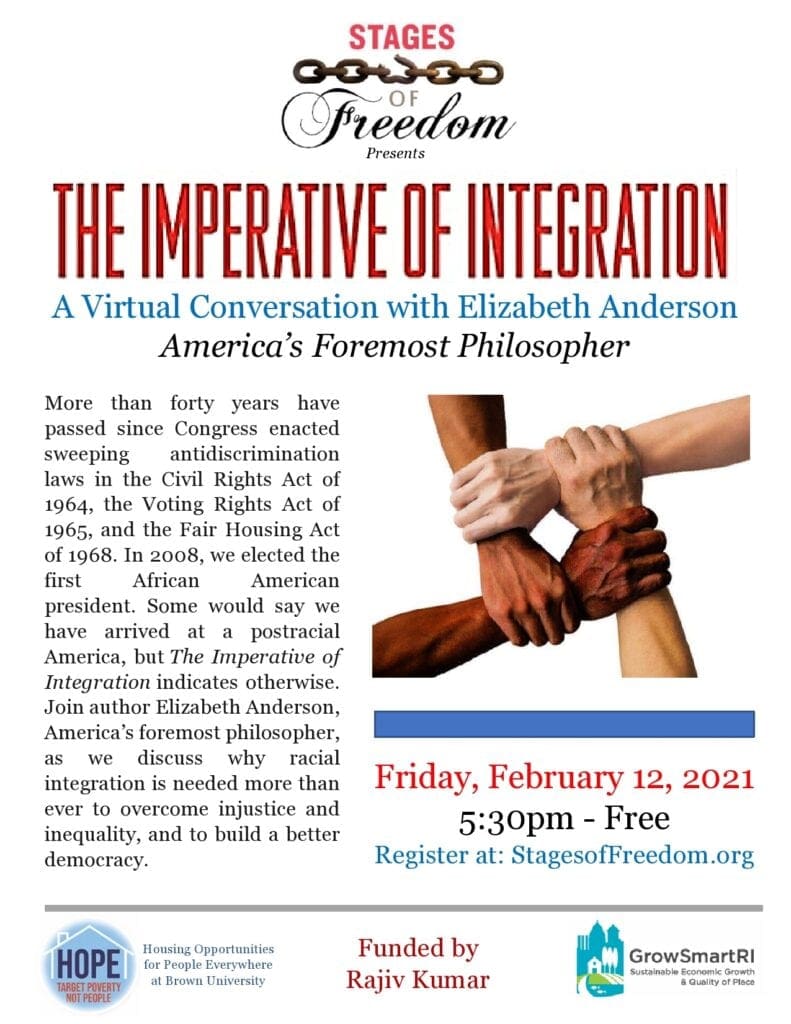
The Grove Hill Library welcomes Roxbury native and author Jennifer Smith Turner for a Virtual Discussion of her Award Winning novel Child Bride. Info here:
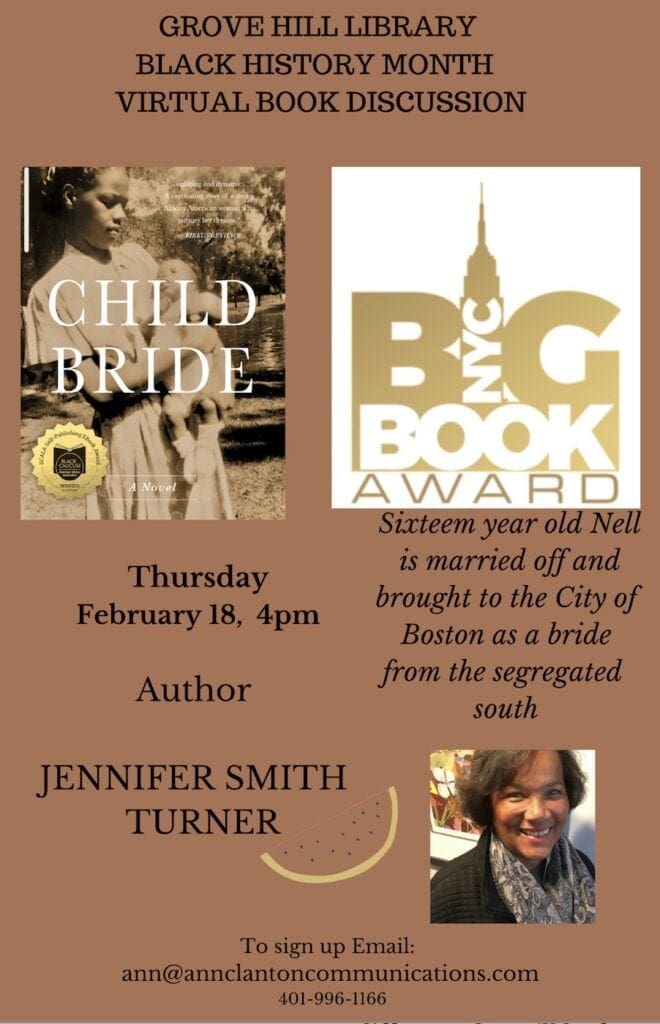
At Trinity Rep – America Too: Reckoning and Resilience initiative will be offered online.This year’s series will focus on Rhode Islanders experiences with systemic racism, the pandemic and the tense election season. Each episode will be anchored by series hosts and creators Michelle Cruz, Christina Bevilacqua and Joe Wilson Jr. Pre-register for the next episode on February 25 at 7:30 p.m. Access to all these virtual events is free, however pre-registration is required as space is limited. “The Writers Room” meets for one hour episodes on February 9, March 9, April 13, May 11 and June 8. A different play will be featured in each. To pre-register and to find more information, visit trinityrep.com/newplays. America Too will be held February 25, March 25, April 27 and May 27. Pre-register at trinityrep.com/americatoo2021.
Cranston Mayor Proclamation of Black History Month by Mayor Ken Hopkins – “We designate February to celebrate the contributions of the black community in fields like government, education, medicine, literature, music, culture, athletics and entertainment. But we must also use this time to remember we have a ways to go as a community in our efforts to promote diversity and being united against racism,” stated Hopkins. The Cranston Mayor quoted former President Gerald Ford who was the first US President to formally recognize Black History Month during the 1976 Bicentennial celebration. Ford urged the nation to “seize the opportunity to honor the too-often neglected accomplishments of black Americans in every area of endeavor throughout our history. Mayor Hopkins said black history must be celebrated and remembered every month not just in February when the birthdays of Abraham Lincoln and Frederick Douglass are recognized. “In our classrooms, museums, universities and community centers we must impress on everyone the pioneers who have been part of our history and helped build our nation. In so doing we must remember the travails and sacrifices that members of the black community have faced in our history.” Hopkins stated.
RI Secretary of State’s website has a plethora of items to review about African Americans in Rhode Island History
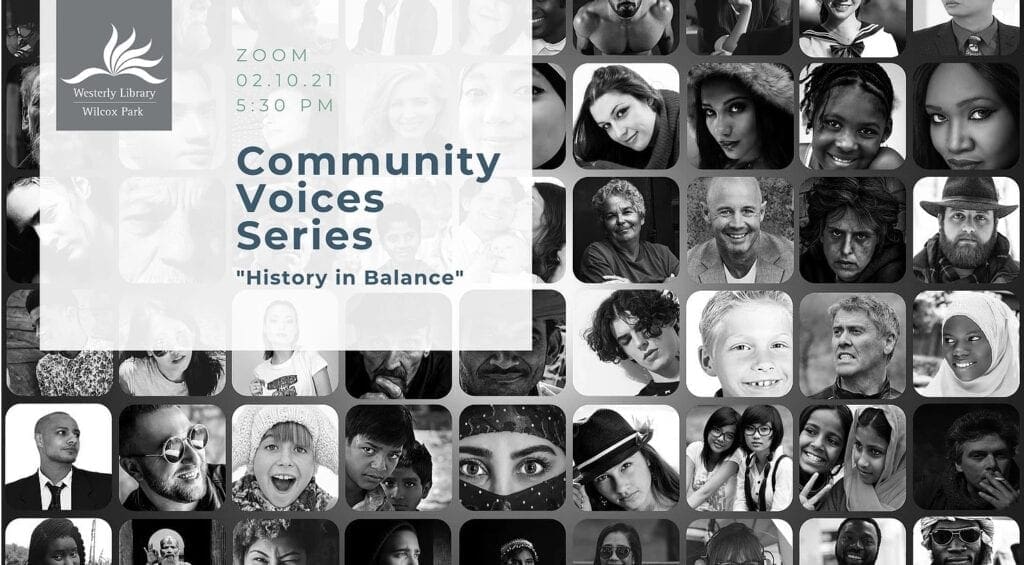
Suited particularly for education for young people. Go here to view it all: https://bit.ly/2N0ukwC – “The history of the African American experience in Rhode Island goes well beyond slavery, however. Rhode Island was the first state to create an explicitly non-white military regiment during the American Revolution. The 1st Rhode Island Regiment, also known as “The Black Regiment,” was comprised of African American and Native American men. It served in several battles including the decisive Battle of Yorktown in 1781. During the Civil War, Rhode Island was one of the first states to propose a voluntary regiment comprised entirely of African American soldiers. Rhode Island’s African American residents were also civically engaged, actively petitioning the General Assembly in their pursuit of equal rights in the 19th and 20th centuries.
From the Martin Luther King Community Center in Newport: Today, February 6 at 1 pm: In-Person Walking Tour: “Creative Survival.” Discover the early history of Newport’s people of color, enslaved and free. Explore the places where enslaved people lived and labored, along with locations where free African-Americans built their enterprises and supported a new local industry. Presented by the Newport Historical Society. $15 non-members, $10 members & military. Purchase tickets; Facebook event
Wednesday, February 10 at 5:30 pm: Virtual Discussion: In recognition of Black History Month, please join the Westerly Library & Wilcox Park for a virtual discussion on the history and current efforts of Rhode Island Slave Medallions. Free. Register; Facebook event – check their full list for more: https://www.mlkccenter.org/post/mlk-community-center-s-guide-to-black-history-month
Linden Place Mansion in Bristol is holding a series of virtual talks, highlighting African-American art and artists of the 20th Century, beginning on Feb. 22nd. Week 1, February 22, 4 PM- 5:15 PM – Jacob Lawrence and Horace Pippen; Rural and Urban Life and the Great Migration – Week 2, March 1, 4 PM- 5:15 PM – Charles White & Elizabeth Catlett; Portraits in Drawing, Printing and Sculpture – Week 3, March 8, 4 PM- 5:15 PM – Romaire Bearden & Basquiat; From Jazz to Hip Hop, Musical Influences. Registration for the 3 sessions is $20. To register, go to: www.lindenplace.org, or contact: suzannelewis@fullchannel.net
Of interest…
February is Black History Month Award Winning Author Jennifer Smith Turner will discuss her NYC Book Award and American Library Association award winner at the following events during Black History Month in February. For additional questions email ann@annclantoncommunications.com. Ann Clanton, 401-996-1166. Sign up for one or all of these virtual book discussions by copying and pasting the link.
Saturday, February 13, 4p.m. Hosted by the Friends of Chilmark Library, you may sign up for the virtual book event by emailing the Chilmark Library Event Coordinator, TThorpe@clamsnet.org or by going to this link.
Thursday, February 18, 7p.m.Hosted by the Grove Hall Public Library- Boston, Massachusetts. Sign up for the Virtual Book Discussion by going to this link.
https://www.eventbrite.com/e/grove-hall-virtual-discussion-of-child-bride-jennifer-smith-turner-tickets-138348747829
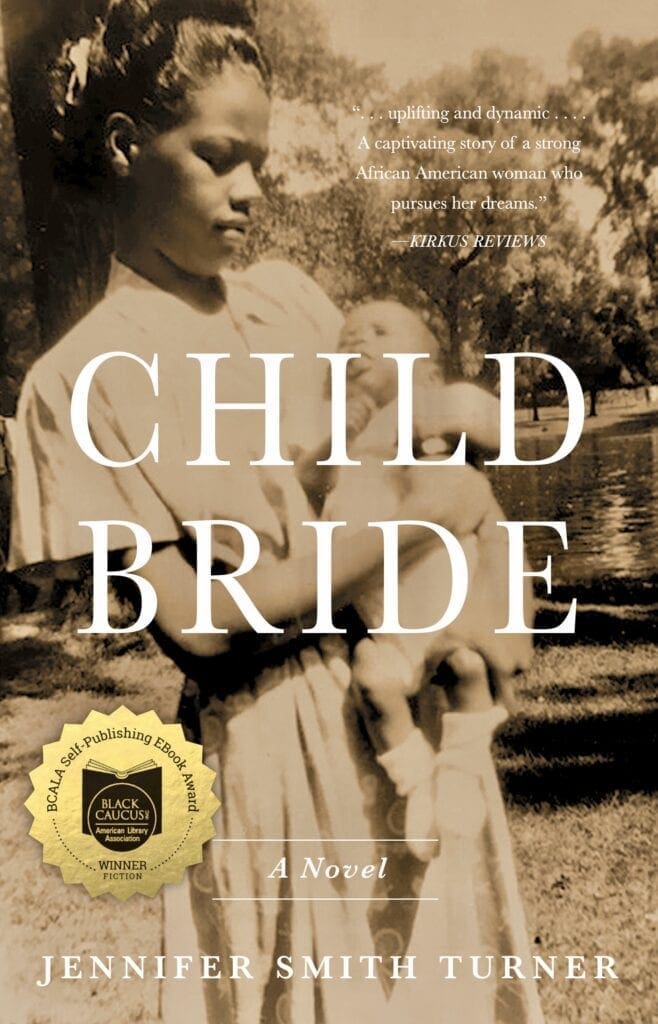
CHILD BRIDE takes place in the segregated South of the mid-1900s, fourteen-year-old Nell bears witness to a world that embraces the oppression of women.Portions of the book take place in Boston and has strong female characters.
_____
Racism is a public health crisis – According to a May 2020 statement from the National Alliance on Mental Illness (NAMI). This means that racism — whether unintentional, unconsciously, or concealed — has affected Black Americans’ access to equal and “culturally competent” health care. For example, it has been widely reported that COVID-19 has disproportionately affected Black Americans. According to the COVID Racial Data Tracker, the death rate for Black Americans nationwide is 2.5 times higher than the rate for white Americans: 67 per 100,000 vs. 26 per 100,000. Employees of the U.S. Centers for Disease Control and Prevention (CDC) sent a letter to their director alleging “widespread acts of racism and discrimination within CDC that are, in fact, undermining the agency’s core mission” that may have indirectly contributed to that disparity. Just as some medical facilities have been overwhelmed by COVID-19 cases, increased anxiety, depression, and post-traumatic stress disorder (PTSD) — in people who are worried they might catch the virus or have been impacted by the lockdown and social isolation needed to control the pandemic — may, in turn, overwhelm the mental health system. Racism is also a stressor for mental health problems. Here is a link to mental health and behavioral health resources specifically for the Black community: https://www.sunshinebehavioralhealth.com/mental-health-issues-facing-the-black-community?utm_source=BMH_Guide&utm_medium=Email02&utm_campaign=BMH_Guide
National Museum of African American History & Culture – Today
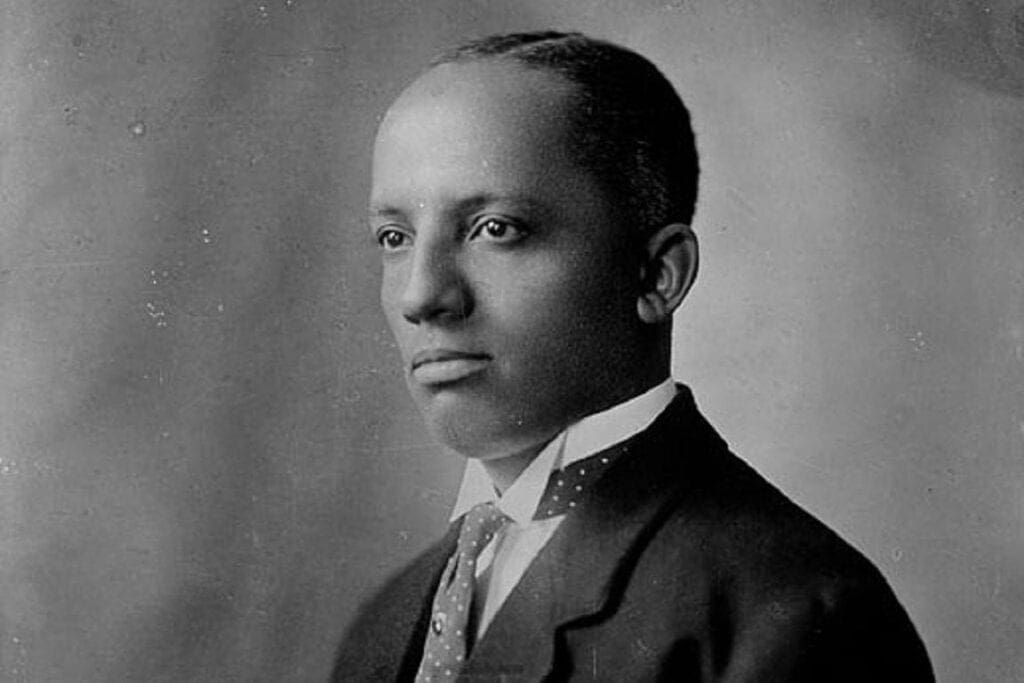
Saturday, Feb. 6; 12 p.m. to 1:30 p.m. ET
The Robert F. Smith Family Center Presents Courthouse Research: Using Probate Records to Research Enslaved Ancestors
Author, teacher and certified genealogical lecturer LaBrenda Garrett-Nelson will share best practices in using probate and other estate records to identify potential slaveholders. This lecture will help prepare participants to break through the 1870 U.S. Census brick wall after they have identified the names of ancestors born during slavery and now find themselves stalled in their research. Admission is free; however, registration is required at https://nmaahc.si.edu/events/upcoming.
Cultural – Movies

To celebrate Black History Month, Tubi, a free movie streaming service, is suggesting movies among a very large collection of what they call “must-see Black cinema movies” including a variety of Black voices from A-listers like Beyoncé and Halle Berry, to comic stars like Jamie Foxx and Ice Cube, to visionary directors like Spike Lee and Tyler Perry. Here are some of the films highlighted and a link to see more featured for Black History Month – Tubi.
Are We There Yet?
The Call
Obsessed
The Last Brickmaker in America
Get On The Bus
Annie
February One: The Story of the Greensboro Four
Tyler Perry’s Madea’s Tough Love
To celebrate Black History Month, Apple commissioned more than 30 Black photographers to capture and share their hometowns with the world through their unique lens, all shot on iPhone 12 Pro. All across the US, these photographers set out to showcase the people and the pockets of their cities that embody their local culture. For Julien James, a local photographer in Washington, D.C., iPhone 12 Pro helped him expand the world around his subjects. “iPhone is my favorite camera to shoot with because it’s in my pocket and I can take it anywhere,” he says. “I typically shoot at 50 millimeters because it’s the closest to the human eye. I want everything I shoot to represent or be as close as possible to what we see naturally, so I was surprised to really see how iPhone 12 Pro actually shot Ultra Wide.” From Washington, D.C., the Bronzeville neighborhood of Chicago, Manhattan Beach in Southern California, Downtown Detroit, and the Bronx, New York, five photographers give a glimpse into their local communities. Go here to view the exhibit: https://www.apple.com/newsroom/2021/02/hometown-shot-on-iphone-12-pro/
Mental Health Resources for Black History Month
On TikTok by PsychHub – go here: https://www.tiktok.com/@psychhub/video/6924396215048129797?lang=en&is_copy_url=1&is_from_webapp=v1
The Thurgood Marshall College Fund & Sallie Mae
As colleges and universities adjust the spring semester to best account for rising coronavirus cases, there are uncertainties about what education looks like in 2021. What remains certain, though, is the role higher education plays in expanding socioeconomic opportunities. We’ve long known this to be true, but in 2021, expansion of opportunity and mobility is all the more crucial: at a time of historic job loss and K-shaped recoveries, education offers a promising path forward. That’s particularly true for minority students and those from underserved communities but too often, they face serious inequities when it comes to accessing and completing college; Black and Hispanic students are enrolling and completing college at a lesser rate than white students.
Recognizing the depth of disparity, Sallie Mae has partnered with the Thurgood Marshall College Fund to expand the Bridging the Dream Scholarship Program, designed to increase access and completion of higher education for minorities and those from underserved communities.
The program will award a total of $3 million in scholarships over the next three years to address access and completion:
· Bridging the Dream Scholarship for High School Seniors: 75 $10,000 scholarships to high school seniors who plan to enroll in a two- or four-year degree professional certificate, or vocational training program.
· Completing the Dream Scholarship: 780 gap scholarships worth up to $2,500 to minority students and those from underserved communities who are on track to graduate but are at-risk of not completing due to financial emergency or unpaid school bill.
Later in 2021, the Bridging the Dream Scholarship for Graduate Students will become available, providing 30 $10,000 scholarships to graduate students striving to access and complete their advanced degrees. Students can apply now through March 8 here.
